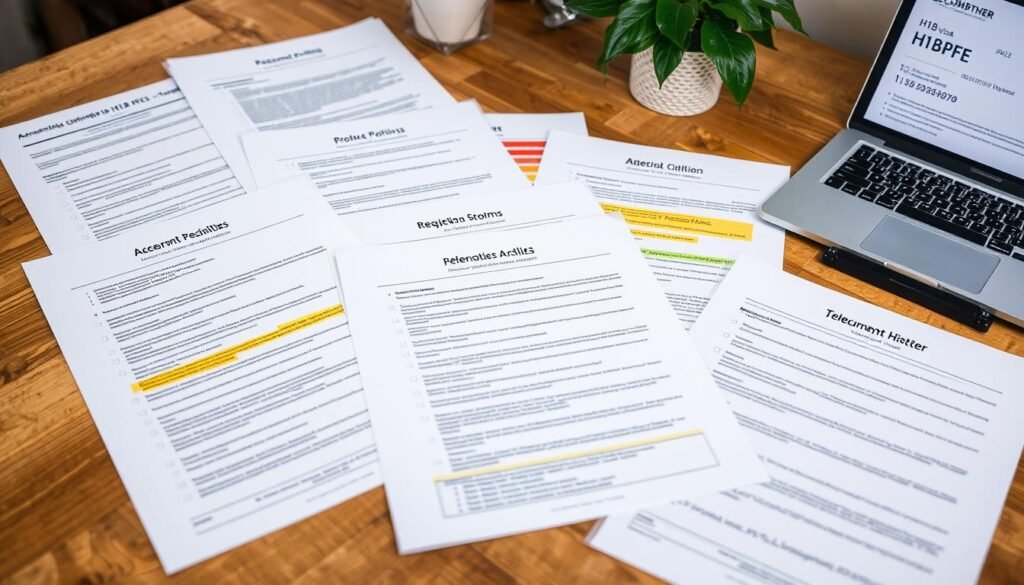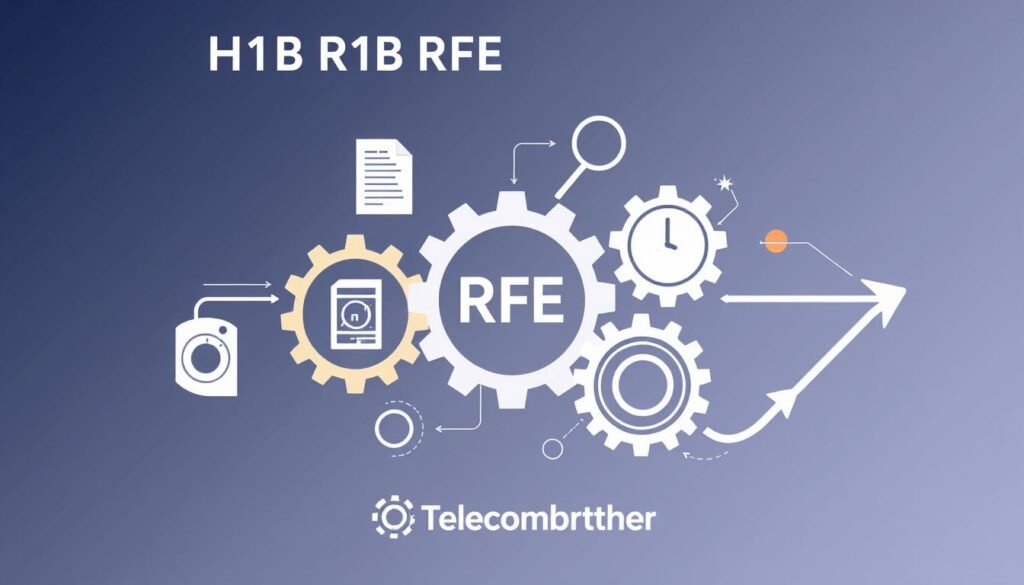Did you know getting an H1B RFE doesn’t mean your visa is doomed? Imagine getting a Request for Evidence (RFE) and feeling scared. But what if this document was your chance to show you’re eligible for a visa?
An H1B RFE is a key moment in your visa journey. The United States Citizenship and Immigration Services (USCIS) asks for more documents to fully review your H1B visa application. Knowing how to handle an H1B RFE can turn your worry into a chance to improve your application.
Handling an H1B visa RFE needs careful planning, knowledge, and staying calm. The H1B RFE is not a no, but a chance to make your application stronger. You can show your skills, job details, and work relationship with your employer.
Key Takeaways
- An H1B RFE is a request for more info, not a visa denial
- Quick and detailed answers boost your approval chances
- Most H1B RFEs are fixed with the right documents
- Knowing common RFE questions helps you prepare
- Getting help from experts can greatly improve your RFE response
Understanding H1B RFE: What It Means for You
Applying for a H1B visa can be tough, and getting a Request for Evidence (RFE) makes it even more challenging. An H1B RFE is not a denial but a key step in your visa journey. It needs careful attention and a smart response.
The United States Citizenship and Immigration Services (USCIS) sends an H1B RFE to get more info about your application. This request helps them make a better decision about your visa.
What is an H1B RFE?
An H1B RFE is a document from USCIS asking for more details or clarification about your visa petition. It’s a chance to make your application stronger, not a barrier to your immigration journey.
- Provides additional chance to prove your eligibility
- Allows you to submit supplementary documentation
- Helps clarify any unclear aspects of your initial petition
Why Do You Receive an H1B RFE?
There are many reasons why you might get an H1B RFE. Knowing these reasons can help you prepare a stronger initial application.
| RFE Trigger | Potential Reason |
|---|---|
| Specialty Occupation | Insufficient proof that job requires specialized degree |
| Employer Relationship | Lack of clear documentation of work arrangement |
| Educational Qualifications | Degree not directly matching job requirements |
Common Myths about H1B RFE
Many people misunderstand the H1B RFE process. An RFE is not a visa denial. USCIS uses tools like the Validation Instrument for Business Enterprises (VIBE) to verify information and ensure a thorough assessment of your application.
“An RFE is an invitation to provide more information, not a rejection of your dreams.” – Immigration Expert
By understanding the H1B RFE process, you can approach your visa application with confidence and preparedness. This can help avoid common reasons for H1B visa denial.
Common Questions in an H1B RFE
Dealing with an H1B Request for Evidence (RFE) can be tough. Knowing what USCIS looks at closely helps you get ready. Let’s dive into the main areas that often lead to an H1B RFE.

Evidence of Employer-Employee Relationship
USCIS really checks if you have a real employer-employee relationship. About 25% of RFEs are about proving this. You need to show:
- Who controls your work
- Employment contracts
- Ongoing work assignments
- Supervision and management
“The strength of your employer-employee documentation can make or break your H1B visa application.” – Immigration Law Expert
Job Duties and Responsibilities Clarification
Your job description is key for H1B visa applications. You must clearly state your job duties. About 15% of RFEs are because job roles are unclear.
Educational Qualifications Inquiry
Your education is important for H1B visa processing. Around 20% of RFEs check your educational background. Make sure to provide:
- Real degree certificates
- Course details
- Credential checks for foreign degrees
- Proof of your field’s specialized knowledge
Being well-prepared can boost your chances of a successful H1B visa application. Anticipate questions and have all the right documents ready. This way, you’ll be ready to handle an H1B RFE effectively.
How to Prepare for an H1B RFE
Dealing with an H1B RFE can seem tough, but with the right steps, you can handle it well. Knowing what USCIS needs is key to a good response.
Gather Required Documentation
Having all the right documents is your best defense against an H1B RFE. You’ll need specific papers to answer USCIS’s questions. Important documents include:
- Detailed job description
- Proof of specialized knowledge
- Employer’s wage verification
- Educational qualification certificates
Organize Your Response Effectively
Your H1B RFE response needs to be well-organized. USCIS wants clear, easy-to-follow documents. Here’s how to structure your response:
- Index each document
- Write a detailed cover letter
- Answer every question in the RFE
“Preparation and precision are key to successfully responding to an H1B RFE.” – Immigration Law Expert
Seek Expert Advice
Getting help from an immigration lawyer who knows H1B visas is a smart move. They can help you respond better.
| Year | RFE Issuance Rate | Approval Rate |
|---|---|---|
| 2020 | 28.8% | 91.4% |
| 2021 | 16.2% | 97.3% |
| 2022 | 9.6% | 98% |
| 2023 | 9.8% | 97.2% |
Remember, you have 90 days to respond to an H1B RFE. Quick and complete documentation is crucial for approval.
Responding to an H1B RFE: Step-by-Step
Handling an H1B RFE can be tough, but with the right steps, you can tackle it. Knowing the process well boosts your chances of getting your visa.
When you get an H1B RFE, time is key. You usually have 30 to 86 days to respond. It’s vital to act fast and smart.
Crafting a Clear, Concise Response
Your response to the H1B RFE must be clear and detailed. Here’s how to do it:
- Read the RFE carefully, noting every specific request
- Organize your supporting documents meticulously
- Prepare a detailed cover letter addressing each point
- Provide clear, direct explanations for any missing information
Addressing All Questions Thoroughly
To succeed in the H1B visa process, answer every question in the RFE. USCIS looks at each case individually, focusing on the totality of evidence.
Remember: You typically have only one opportunity to respond to an H1B RFE, so make it count!
Double-Check Your Submission
Before you send in your H1B RFE response, make a checklist:
- Verify all documents are included
- Ensure documents are properly translated
- Check that all information is consistent
- Review for completeness and clarity
In 2019, H1B visas with an RFE had a 62.7% approval rate. By following these tips, you can increase your chances of success.
| RFE Response Component | Importance Level |
|---|---|
| Comprehensive Documentation | High |
| Clear Explanations | Critical |
| Timely Submission | Essential |
Tips for a Successful H1B RFE Response
Handling an H1B RFE can be tough, but with the right steps, you can boost your approval chances. The H1B RFE process needs careful focus and smart planning.
Getting an H1B RFE doesn’t mean you’re out of the running. In fact, 26% of applicants got their H1B visa despite RFEs. Your response is key to showing you’re eligible.
Highlight Your Qualifications
When you respond to an H1B RFE, show off your skills and education. Make it clear how your qualifications fit the job needs. Some effective strategies include:
- Show how your degree matches the job
- Offer detailed proof of your professional skills
- Explain how your background meets H1B visa needs
Provide Relevant Evidence
You must prove your case during an H1B RFE. Gather all the documents needed to answer USCIS questions. Important documents should include:
- Job descriptions
- Academic records
- Professional certifications
- Proof of your work relationship
Maintain Professional Communication
Your H1B RFE response should be clear, to the point, and professional. Stay away from emotional language. Focus on giving accurate, organized info that answers USCIS questions.
“Precision and clarity are your best allies in an H1B RFE response” – Immigration Law Expert
| RFE Response Strategy | Key Considerations |
|---|---|
| Qualification Proof | Detailed academic and professional documentation |
| Communication Style | Professional, factual, comprehensive |
| Evidence Submission | Address all USCIS concerns directly |
Remember, a well-prepared H1B RFE response can turn a potential setback into a successful visa approval.
What Happens After You Submit Your H1B RFE Response?
After you send in your H1B RFE response, it’s important to know what comes next. The USCIS review process can be unclear. But, knowing what to expect can ease your worries.

USCIS Review Process
USCIS starts checking your H1B RFE response carefully. The time it takes to process your visa depends on your case’s details. Usually, without premium processing, it can take up to 60 days.
Possible Outcomes of H1B RFE
Your H1B RFE response can lead to a few outcomes:
- Approval of your H1B visa application
- Request for more evidence
- Denial of your application
Next Steps If Denied
If your H1B RFE response is denied, you still have options. Reasons for denial include:
- Not enough documentation
- Not proving you have a specialty occupation
- Not showing a clear employer-employee relationship
“The key to a successful H1B RFE response is thoroughness and precision in your documentation.” – Immigration Law Expert
Pro tip: If denied, think about getting an immigration attorney to explore appeal options.
Remember, every H1B RFE is different. With careful preparation, you can boost your chances of success.
Frequently Asked Questions about H1B RFE
Dealing with an H1B RFE can be tough and stressful. Knowing about H1B visa processing times and employee rights helps. With about 30% of H1B Transfer applicants getting an RFE, being ready is key.
How Long Does It Take to Get a Decision?
After getting an H1B RFE, you usually get a response in 60 to 90 days. USCIS gives you up to twelve weeks to answer fully. The time it takes can vary, depending on how complex your case is.
Can You Work While Your H1B RFE Is Pending?
Your rights as an H1B visa holder during an RFE are a bit tricky. Usually, you can keep working while the RFE is being looked at. But, you must stay legal and avoid anything that could risk your work permit.
What to Do If You Receive Multiple RFEs?
Getting multiple H1B RFEs can feel overwhelming. But, it’s common. The important thing is to answer each one carefully and fully. Get help from an immigration lawyer who knows H1B visas well. They can help you write clear, detailed answers that USCIS will like.